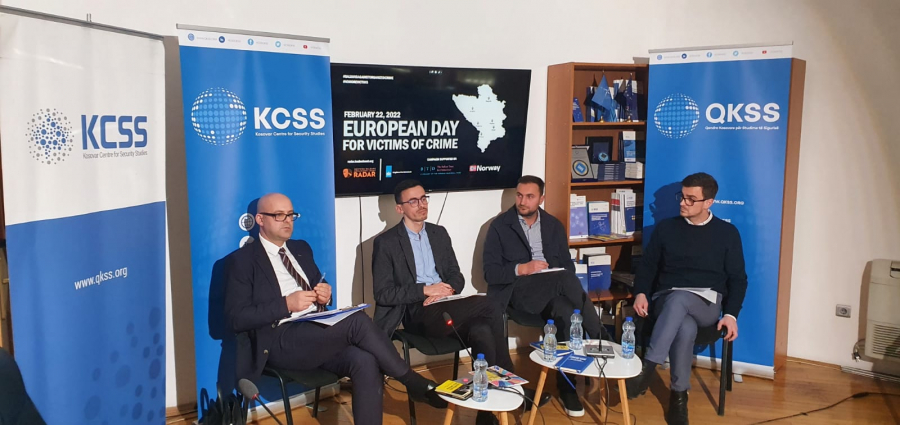23/02/2022

Kosovar Centre for Security Studies (KCSS) today, on 22nd of February, 2022, on the occasion of the European Day for Victims of Crime, organized a discussion on the challenges and the way forward in the protection of victims of crime in Kosovo. Part of the discussion panel were Lieutenant Colonel Fehmi Xhata, Director of the Directorate for Investigation of Trafficking in Human Beings, Kosovo Police, Mr. Leotrim Gashi, Senior Legal Researcher, Kosovo Institute for Justice (KLI) and Mr. Muharrem Ademi, Expert of Addiction, LABYRINTH Addiction Counseling and Treatment Center.
Kosovar Centre for Security Studies (KCSS) today, on 22nd of February, 2022, on the occasion of the European Day for Victims of Crime, organized a discussion on the challenges and the way forward in the protection of victims of crime in Kosovo. Part of the discussion panel were Lieutenant Colonel Fehmi Xhata, Director of the Directorate for Investigation of Trafficking in Human Beings, Kosovo Police, Mr. Leotrim Gashi, Senior Legal Researcher, Kosovo Institute for Justice (KLI) and Mr. Muharrem Ademi, Expert of Addiction, LABYRINTH Addiction Counseling and Treatment Center.
The discussion focused on the effectiveness of relevant policies and strategies for the prevention and combating of organized crime and the protection of victims of crime and the challenges of their implementation in practice. In this regard, it was noted that while the legal and strategic framework adequately covers victim protection and is in line with the standards of various international institutions and organizations, its implementation in practice leaves much to be desired. One of the key problems that were highlighted in this discussion is the compensation of victims of crime, namely the capitalization of Law no. 05 / L-036 on the compensation of victims.
The main problems in this regard are related to the lack of information on the existence of such a law and consequently the non-exercise of this right by victims of crime. Although the law stipulates those various institutions that have direct contact with victims such as the Police, Courts, Prosecution, Health Institutions, Centers for Social Work, etc., should direct victims to the compensation program, many of these institutions lack public information about this program. Moreover, in many cases, even victims' advocates do not have information on victim compensation and express uncertainty about the functioning of this law. On the other hand, even during court proceedings, there is uncertainty whether compensation should be treated during criminal proceedings or as a separate process in civil proceedings, thus discouraging victims from benefiting from this law.
The discussion also addressed the excessive length of court proceedings, a problem that goes to the detriment of victims of crime. The discussion argued that prolonging the handling of cases in the courts puts victims of crime at risk because it increases the potential for exposure to perpetrators, violates the confidentiality of victims, and calls into question the dignified treatment of victims of crime by Kosovo institutions. In this respect, such a practice is extremely discouraging for all those who report crimes or are potential victims of crime. Moreover, the inefficiency of the justice system also severely undermines citizens' trust in the various institutions that are involved in the protection of victims, regardless of the competencies they have.
Furthermore, this activity has discussed the treatment of drug addicts and the high exposure of young people under 18 to drugs. In particular, the need to raise awareness that drug use should be seen through the prism of public health and capacity building of various institutions for the treatment of addiction was discussed.During the discussion, it was pointed out that the criminalization of drug use does not coincide with the policies of EU countries, while an approach from the perspective of criminal responsibility risks stigmatizing drug users and further deepening this problem.
This discussion was organized in the framework of the regional consortium "Organized Crime Radar in the Western Balkans (WB-OCR)". The WB-OCR aims to strengthen the role of civil society in combating organized crime in the Western Balkans to contribute to the development of effective and long-term policies against organized crime in the context of EU enlargement (Chapter 24: Freedom, Security, and Justice). The project comes as a response to the incomplete and ad hoc debate over organized crime and the lack of regular independent analysis and evaluation which exposes the reasons for governments' inefficiency in the fight against organized crime.